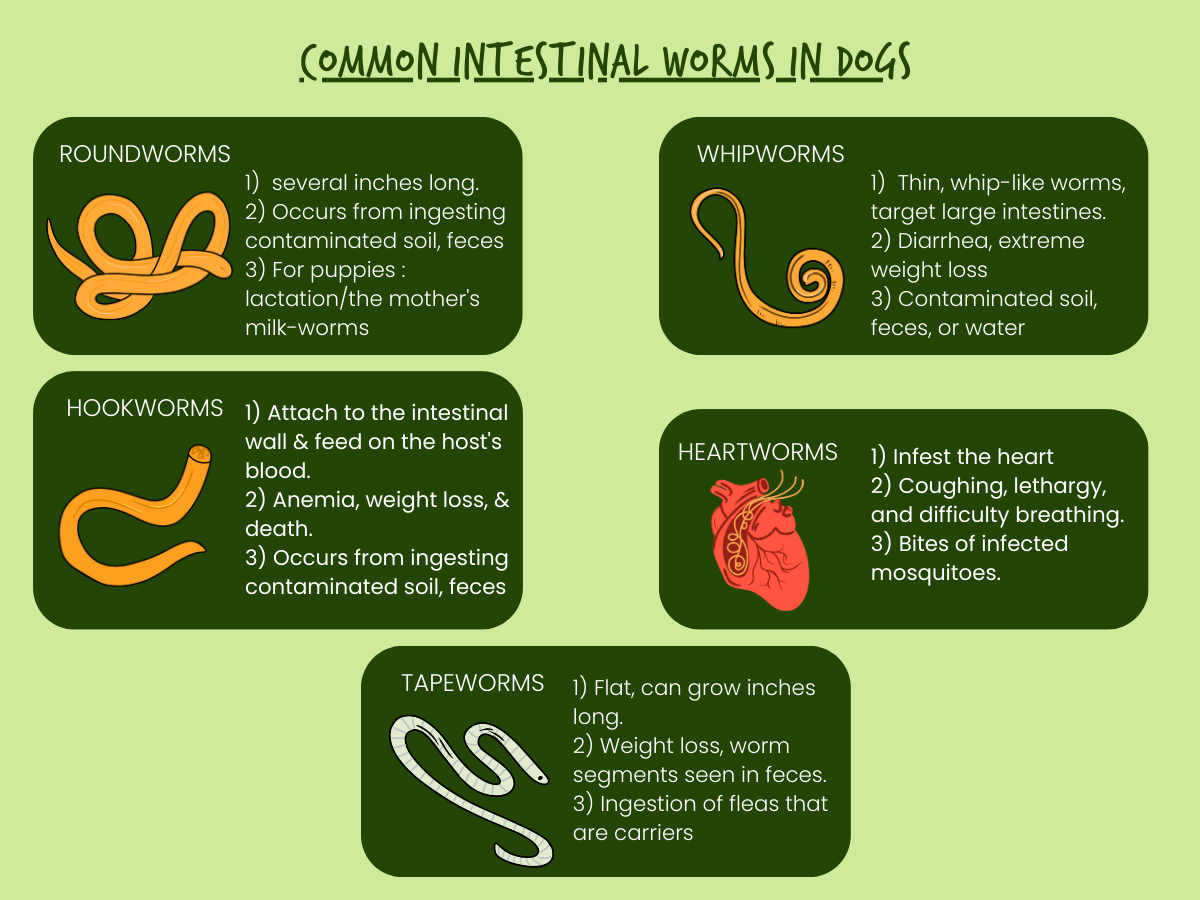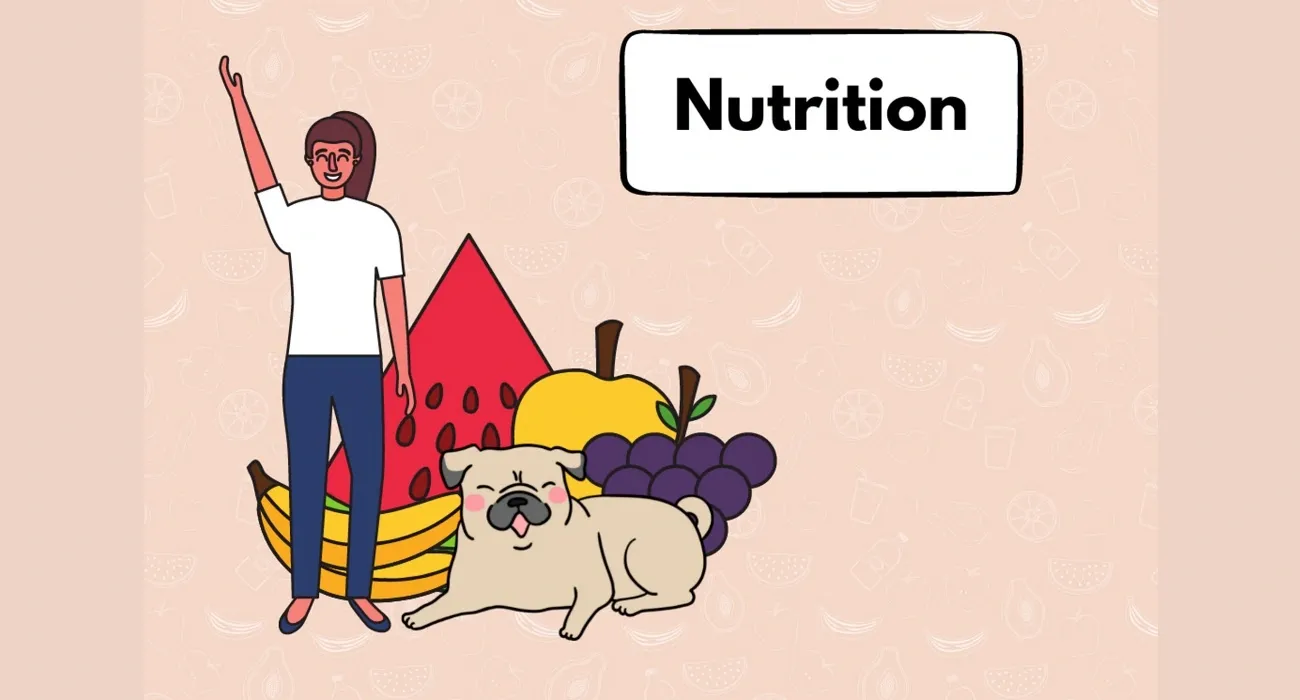Regular deworming is vital for a dog to be in good health and shape. Deworming prevents the growth of worms and parasites in a dog’s body. Worms interfere with a dog's digestion, energy, and general well-being. Timely deworming ensures that they do not suffer from the effects of worms in their body.
This guide will dive into the details of different types of worms, their effects on a dogs, body, deworming schedules, indicators that a dog has worms, and preventive measures to keep your dog free of worm infestations.
Worms that Affect Dogs: Understanding The Hidden Threat

There are several types of worms that can be dangerous for dogs, together with various risk factors relating to health.
- Roundworms
Roundworms, especially Toxocara canis, are common intestinal parasites of dogs. They are characterized by a spaghetti-like twist and can be several inches long. Infected dogs may vomit, pass malodorous, liquid stools, and lose weight as the parasites consume some nutrients.
Roundworm infections start from ingesting contaminated soil, feces, or through the ingestion of larvae while consuming infected prey. Other modes of acquiring the parasite by puppies include lactation or the mother's milk-worms. - Hookworms
Hookworms, primarily Ancylostoma caninum, are small parasites that attach to the intestinal wall and feed on the host's blood. Hookworms can result in the following: severe anemia, lethargy, weight loss, and possibly death in severe cases, especially in puppies.
Dogs become infected when they consume larvae from contaminated soil or feces, through skin penetration by larvae, or from nursing infected mothers. Hookworms are zoonotic, meaning they may also infect humans. - Tapeworms
Tapeworms are flat, segmented worms that may grow as much as several feet long. The most frequently found types in dogs are Dipylidium caninum. Symptoms include weight loss despite a good appetite and segments of the worms visible in the feces or near the dog's anus.
Dogs usually become infected by the ingestion of fleas that are carriers of eggs of the tapeworm or through feeding on infected rodents. - Whipworms
Whipworms (Trichuris vulpis) are thin, whip-like parasites inhabiting the large intestine. These can cause severe diarrhea, extreme weight loss, and anemia through blood loss.
Whipworm can infect dogs through the ingestion of contaminated soil, feces, or water. The eggs of the whipworm parasite pass in the feces of infected dogs, where they remain relatively long for a period of time under proper atmospheric conditions. The eggs hatch in the intestines after being ingested by the host dog-sniffing or licking contaminated environments caused by fecal matter. Proper sanitation measures, keeping up with regular deworming, as well as restrictively avoiding contaminated areas, probably would keep whipworms from infecting dogs. - Heartworms
Heartworms (Dirofilaria immitis) are parasitic worms that infest the heart and the pulmonary arteries of infected dogs. This parasitism can lead to serious cardiovascular problems, and lead toward heart failure and lung disease. Symptoms include coughing, lethargy, and difficulty breathing.
Heartworm is a transmittable disease that takes place through bites of infected mosquitoes. This infectious modality enters the dog’s blood flow system while the infected mosquito feeds. - Other Types of Worms
Other types of worms that may infest dogs include Coccidia, Giardia, and Fleas, and there are instances where parasitic infections get aggravated. The dog owners, thus, must take regular veterinary checks to keep these parasites under control and treat them accordingly.
Signs Your Dog Needs Deworming
Vomiting or Diarrhea
When it comes to worm infection, as is commonly repeated, the GI problems such as vomiting and diarrhea could be complicated by occasional presence of blood in them. This means that the dog's body is getting rid of the worm, and voluntary diarrhea results in dehydration within the children's population and small breeds.
Worms Visible in Feces
Another almost certain indication is seeing worms or worm eggs in the dog's stool. Although not all worms can be seen, there are segments of tapeworms that appear rice-like and roundworms that look quite similar to spaghetti. If you do happen to find any, please consult your veterinarian.
Sudden Weight Loss
Another symptom is a significant loss of weight but with an outright healthy appetite. A lethargic dog is a tired dog, or a dog merely less active than its normal self. This may, in turn, arise from anemia caused by prolonged blood loss due to some worms that complete their life cycle within.
Bloated Stomach
Abdominal distention or simply "potbelly" is a very strong indication of worms within a dog, particularly in puppies. This is basically attributed to the accumulation of worms in the intestines. Dogs that lick or scoot their bottoms are generally starting to get irritated by worms that reside in the anal area and are doing that to relieve the discomfort.
See to it that whatever combinations of signs you observe among these meld into a rather serious look into it; go for immediate assessment and treatment from a vet.
Types of Dewormers For Your Dog
There are two types of dewormers for dogs: broad-spectrum or targeted agents.
Broad-Spectrum Dewormers
Broad-spectrum dewormers are designed to kill a wide variety of intestinal parasites such as roundworms, hookworms, tapeworms, and whipworms. These are useful drugs when the suspicion is that more than one type of worm is involved. Most effective and convenient, these so-called broad-spectrum dewormers come in oral tablets, liquid suspensions, and some topical medications.
Oral tablets are the most common, while liquid forms may be a better choice if the dog won’t take a pill. These dewormers can be given as one dose or as a short treatment course, depending on how severe the infection is. Broad-spectrum dewormers should be administered regularly, especially to puppies or dogs exposed to potentially contaminated environments.
Targeted Agents
Targeted dewormers are designed to eradicate certain types of worms such as tapeworms, roundworms, or hookworms. For example, praziquantel is effective against tapeworms, while pyrantel pamoate treats roundworms and hookworms. These dewormers are employed when a particular parasitic infection has been diagnosed.
They are commonly given as oral tablets or liquids and; sometimes, they are administered in topical forms. Targeted dewormers are administered following diagnostic tests such as fecal examinations and are effective against the recognized parasite. Follow-up doses are usually needed to ensure the complete eradication of the parasite.
Always check with your vet regarding the type of worms present in your dog’s and the best solution for it.
Factors to Consider Before Choosing the Right Dewormer for Your Dog
When it comes to administering the dewormer, the factors that are important to consider include age, size, breed, and lifestyle of a dog.
- There should be differences in the formulation suitable in puppies as compared to adult dogs.
- Apart from this, once the specific type of worm is officially identified with the laboratory test, they can easily select the specific treatment.
- Consulting a veterinarian is critical before giving any dewormer to your dog. The vet will recommend the treatment appropriate for your dog which ensures safe and effective treatment. Such professional advice is critical for achieving the best results for your canine deworming program.
Dog Deworming Schedule
Puppy Deworming Schedule
- Puppies are advised to be dewormed every 2 weeks starting when they are 2 weeks up to 12 to ensure they grow up healthy. After that, they should be dewormed at least every month until 6 months of age. Frequent deworming is extremely important in puppies due to the great susceptibility to infections from the mother or environment when they put all sorts of things in their mouths.
Adult Dog Deworming Schedule
- Adult dogs, however, normally require a deworming schedule that places treatments every 3-6 months depending on their lifestyle and environment. Dogs more exposed to other animals and those that spend some of their time outside will require more frequent deworming. It is equally crucial to factor in a heartworm preventer effective against roundworms and hookworms in the dog's schedule to guarantee all-around safety.
Senior Dog Deworming Schedule
- Senior dogs should follow the same deworming schedule as adults, although some adjustments should be made that may depend on their state of health and a veterinarian's advice. To set an adequate schedule accordingly for senior dogs, regular check-ups with the vet become crucial, as the aging dogs have an immune system that is weaker and more prone to infections.
Post-Deworming Care
After deworming, your dog may experience some mild side effects such as diarrhea or sleepiness. This is quite common, mainly due to the effect of the dying worms being eliminated from the body, sometimes still visible in feces for a few days. This can be quite disturbing but isn't very serious, since those conditions will most probably clear off in a day or two.
Post-deworming, proper hydration and plenty of rest will help ease the dog. It's important to make sure your dog drinks enough fresh water and encourages drinking behavior. Watch for other signs, and in case of any unusual reactions or continued symptoms, consult your vet. This kind of attention will support your dog's recovery process and general well-being.
Why Early Identification Matters?
Identifying worm infestations early can prevent severe health complications, including malnutrition, anemia, or intestinal blockage. Early deworming also prevents secondary infections by weakening the immune system, besides minimizing the spread of zoonotic worms that may infect the human body.
Risks of Untreated Worm Infestations
Worm infestations in dogs, when left untreated, can lead to severe health complications. Some symptoms that result from prolonged exposure include chronic gastrointestinal dysmotility in the form of diarrhea, vomiting, and severe weight loss. Such complications not only reduce the quality of life for dogs, but they also can create nutritional deficiencies.
Adult and puppy forms of worms cause stunted growth. This occurs when the little ones cannot benefit from the nutrients given to their bodies. Apart from similar worms like heartworms, they cause possible organ damage to normal organs with serious health concerns.
Any delay in treatment can lead to the dog’s health deteriorating and can even be the cause of more serious complications. The best way to prevent this is through early detection and treatment.
Preventive Care to Avoid Worm Infestations
To effectively control worm infestations in dogs, maintaining a clean environment is very important. Regularly clean the areas where your dog lives and eats, and promptly dispose of feces to minimize contamination hazards. It kills the germs that cause it and prevents the transmission of parasites from one infected animal to another. As fleas can carry tapeworms that your dog can ingest, antibiotics are necessary.
Dietary balance can do wonders in fighting a worm infestation. Don't feed raw or undercooked meat to your dog as it contains parasitic larvae. Treat it with high-quality commercial dog food that suits its nutritional needs.
Make regular health exams a habit for the early detection of any possible problems. Schedule an appointment with your vet for regular fecal examinations to catch infestations before they escalate. While you can look for symptoms such as a bloated abdomen, scooting, or lethargy, these usually mean your dog might be dealing with a worm infestation.
Finally, follow a deworming schedule as prescribed by your vet. Continuous deworming protects your dog from serious health issues linked to worm infestations to ensure a healthy and happy pet. By following the above-mentioned preventive measures, you can alleviate most of the possibilities of worms affecting your beloved pet.
Concluding Thoughts
Deworming is a regular process for the health of your dog. Following a deworming schedule for dogs can be effective in preventing your dog from parasitic infections. However, it is always important to seek advice from your veterinarian about what is best for your dog.
Join sploot for all your queries, pup talks, and events, and find us on Instagram for more updates.
FAQs on Dog Deworming
How to know when it is deworming time for dogs?
- The deworming must be performed upon the recommendation of your veterinarian, usually at standard intervals, at least every three to six months.
Is it safe to rely on a deworming chart for dogs, or should I consult a vet?
- A deworming chart is a useful guideline, but consulting your veterinarian is the best way to go for personalized recommendations.
Do worming schedule and deworming schedule for dogs mean the same?
- Yes, both refer to a regular deworming schedule for your dog.
Can I deworm my dog without going to the vet?
- Maybe, but your vet can really keep the proper dewormer and dosage for the unique requirements of your dog.
How often should deworming be done in dogs?
- Deworming should be done every three to six months, but your veterinarian can recommend something more specific based on your dog's health.









